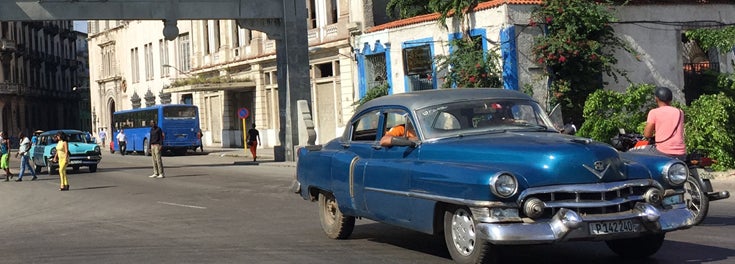
The old Chevys were charming, Hemingway’s house was “cool’’ and the Museum of the Revolution was moving, but it was the pickup baseball game with a bunch of 10-year-olds that URI senior Tyler Figgis remembers most about his trip to Cuba over winter break. They played under palm trees in a small village. A stick sufficed as a bat; scars marked the baseballs. Still, Figgis and his URI classmates had the experience of a lifetime. “We got clobbered,’’ says Figgis, of Stratford, Conn. “But the fact that we were in Cuba playing the national sport was incredible.’’
It’s impressive enough that Figgis and 19 other URI students visited the Communist country as part of URI’s “J-term” (or January) offerings, but even more amazing that they went just weeks after the United States restored diplomatic ties with the nation, ending an embargo imposed after Fidel Castro came to power in 1959. “We had planned the trip months ago, but our timing to go was perfect,’’ says Political Science Professor Maureen Moakley, who joined the students. “It was a great trip. The students were over the moon.’’ The journey was such a success Professor Moakley and Economics Professor Richard McIntyre, who also went, plan to return next year with another group of students. But future travelers take note: spots will probably fill up fast.
Carrying cameras and journals, the students spent 10 days touring the island, visiting museums and universities; living with families in the countryside; talking with writers and artists; and even rapping with a hip hop singer. They gobbled down rice and black beans, sweet-tasting tomatoes and fresh salads with veggies plucked from thriving organic farms. Back home, they were eager to share their experiences.
“The Revolution is very much alive in Cuba,’’ says Figgis. “They don’t have any commercial advertising – no ads for Coca-Cola, just billboards of Castro. Not a lot of capitalism going on down there.’’
That’s expected to change – quickly. U.S. Congressional leaders are already making trips to the island to drum up business, which should translate into money and jobs for the Cuban people, says senior Jason Rosenblum, of Howell, N.J. “When I told people I’m from the United States their whole demeanor changed,’’ he says. “They got really happy, especially the younger generation. They have even less reason to leave now.’’
Two things stood out for him: Cubans are highly educated, thanks to an excellent public education system; and they’re aware of what’s going on beyond their border. “They’re not as isolated as people think,’’ he says. “They knew about politics and music all over the world.’’ He says Cubans also admire Americans, which he found surprising considering the decades-old rift. “They love Obama,’’ says Rosenblum. “They can’t wait to be able to trade with the United States and travel back and forth.’’
For Gianelle Alba, a senior from Providence, the Cuba she saw was not the one she’s read about in American history books. “I was taught that Cuba was a controlling, violent country. It wasn’t. Cubans are the happiest people I’ve ever met.’’ The trip, she says, was “mind blowing.’’ That’s another way of saying it changed her life.
